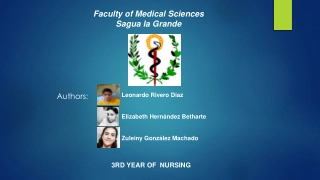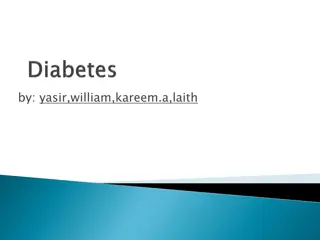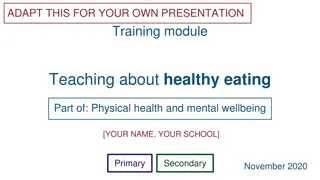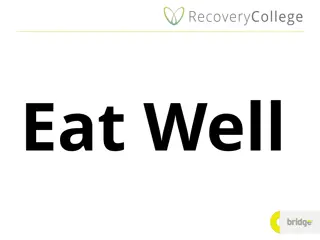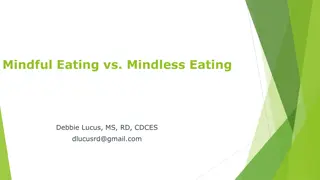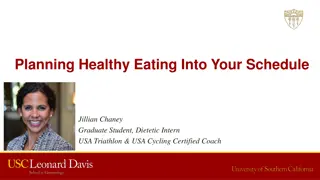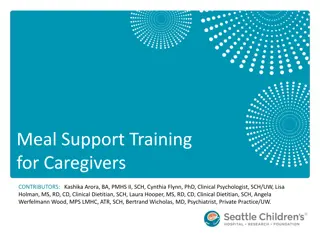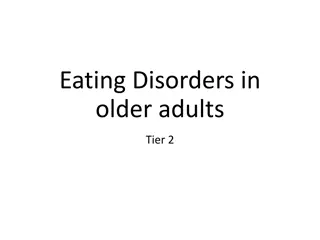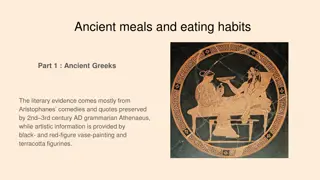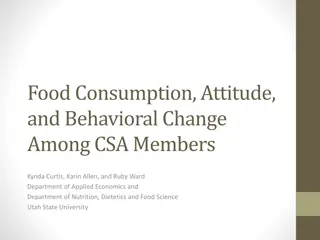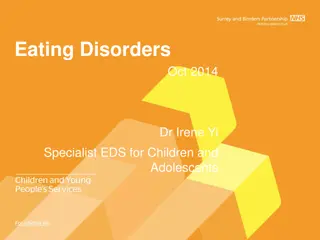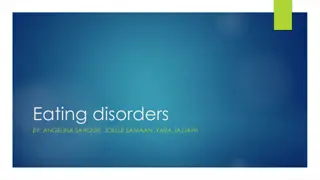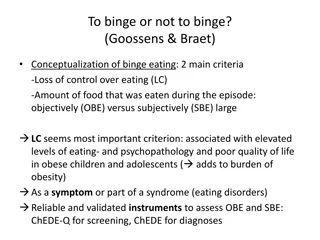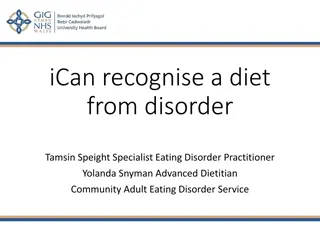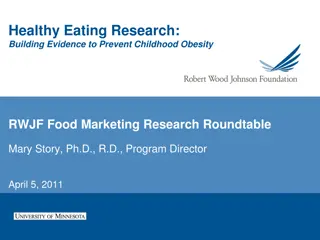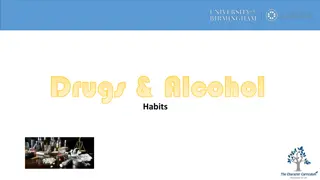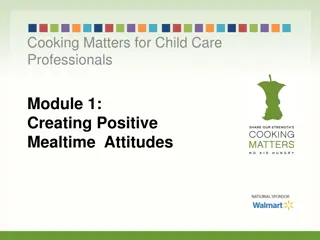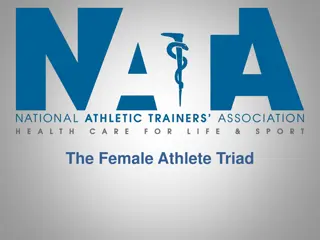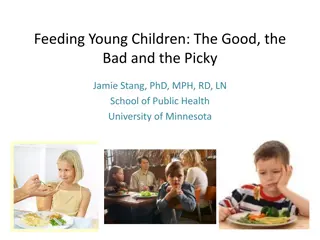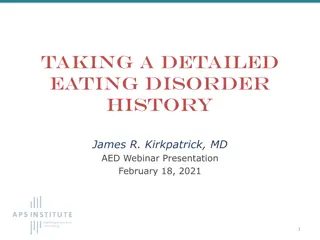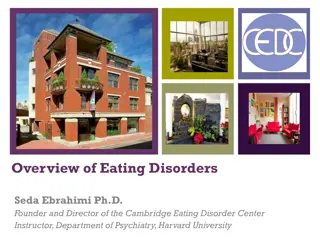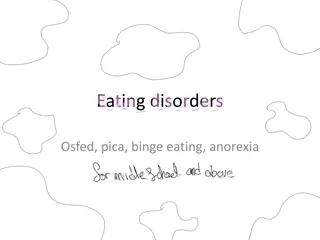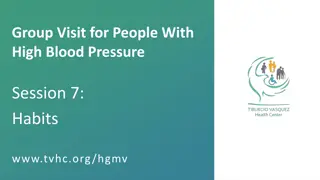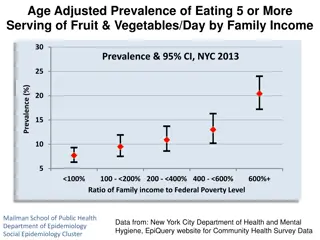Faculty of Medical Sciences Sagua la Grande
Unhealthy eating habits can increase the risk of chronic diseases such as obesity, cancer, cardiovascular diseases, and diabetes mellitus. Actions like consuming sugary drinks, not drinking enough water, snacking between meals, and avoiding a balanced diet contribute to poor health outcomes. By regu
1 views • 9 slides
EXERCISE ADDICTION AND DISORDERED EATING IN ADOLESCENTS
A study led by Dr. Mia Beck Lichtenstein introduces the Exercise Addiction Inventory for Youth (EAI-Y) to assess exercise addiction in adolescents, particularly those with disordered eating. The research aimed to validate the EAI-Y, estimate the prevalence of exercise addiction in active adolescents
2 views • 10 slides
Stress Eating and Resources for PATHWEIGH May 5
Dr. Liz Chamberlain discusses stress eating strategies, focusing on why people eat when stressed, mindfulness techniques to handle food cravings, identifying habits and rewards related to eating, and practicing the HALT method to manage cravings effectively. She emphasizes curiosity, mindfulness, an
1 views • 12 slides
Understanding Diabetes: Causes, Symptoms, and Prevention
Diabetes is a chronic illness affecting how our bodies convert food into energy. It is characterized by high blood sugar levels due to insufficient insulin production or resistance. Symptoms include increased thirst, hunger, and fatigue. Genetics, lack of physical activity, and unhealthy eating habi
0 views • 8 slides
Teaching Healthy Eating for Physical Health and Wellbeing
This training module focuses on teaching about healthy eating as part of physical health and mental wellbeing in primary and secondary schools. It provides guidance on the new curriculum, strategies for teaching, and related topics such as design and technology and science. Educators will gain confi
0 views • 99 slides
Understanding Obesity: Causes, Consequences, and Prevention
Obesity is a treatable disease caused by genetic and environmental factors that can have serious health consequences like cardiovascular disease, diabetes, and certain cancers. Preventing obesity involves eating a healthy diet, exercising regularly, and practicing mindful eating habits. Awareness an
3 views • 9 slides
The Importance of Healthy Eating for Mental Well-Being
Eating well plays a crucial role in maintaining mental health. Nutrient-dense foods can improve mood, cognitive function, and energy levels. Building healthy eating habits, identifying barriers, and addressing emotional eating are keys to achieving overall well-being.
0 views • 11 slides
Challenges of Adolescent Nutrition: Addressing Concerns and Solutions
Adolescents, especially girls, face numerous challenges in maintaining proper nutrition due to societal pressures and lifestyle choices. Lack of essential nutrients like calcium and Vitamin D, coupled with unhealthy eating habits, can lead to long-term health issues. Addressing these concerns is cru
1 views • 26 slides
Insights into Mindful vs. Mindless Eating Behaviors
Understanding the contrast between mindful and mindless eating through real-life scenarios and experiments reveals how external cues, portion sizes, and presentation influence our eating habits and perception of food. From unknowingly refilling soup bowls to pouring more liquid into certain glass sh
0 views • 25 slides
Tips for Incorporating Healthy Eating into a Busy Lifestyle
Factors influencing healthy choices include taste, time, and total cost. Debunking myths, eating healthy doesn't have to be bland or time-consuming. Practical tips for healthy eating in and out, emphasizing balance and informed choices. Eating healthy can be budget-friendly with smart decisions and
2 views • 15 slides
Essential Meal Support Training for Caregivers of Individuals with Eating Disorders
Comprehensive meal support training program for caregivers of individuals with eating disorders. Contributors include professionals in psychology, dietetics, and psychiatry. Covered topics include treatment basics, family-based approaches, caregiver expectations, and modeling healthy eating behavior
0 views • 56 slides
Understanding Eating Disorders in Older Adults
Eating disorders can affect older adults too, yet they are often overlooked or misdiagnosed. Challenges in diagnosing these disorders arise from various underlying health conditions. Types of eating disorders include anorexia nervosa, bulimia nervosa, binge eating disorder, and others. Recognizing c
0 views • 7 slides
Empowering Yourself in the Workplace Through Positive Habits
Explore the concept of self-empowerment in the workplace by understanding how habits shape your professional identity. Discover positive and negative workplace habits and learn to take charge of your destiny through conscious decision-making. Engage in a workplace habits exercise to assess your habi
2 views • 21 slides
Engaging English Lesson for Class Three Students: Healthy Eating and Food Choices
In this interactive English lesson for Class Three students, the focus is on promoting healthy eating habits and making informed food choices. The lesson covers a range of topics including identifying healthy and unhealthy foods, new vocabulary, reading exercises, and discussing the importance of co
0 views • 21 slides
Understanding Healthy and Unhealthy Fears in Light of Scripture
Exploring the concept of fear as depicted in biblical verses, this content highlights the importance of a healthy fear of God for wisdom and understanding. It contrasts healthy fears that lead to blessings with unhealthy fears driven by human standards and reactions. Encouragement is given to overco
0 views • 13 slides
Czech Eating Habits and Traditional Food Overview
Explore the typical Czech meals like roasted sirloin beef with Czech dumplings, pork with dumplings and sauerkraut, soups, gingerbread, beer, and rolls. Discover the traditional Czech foods enjoyed during holidays such as Christmas cake, fish soup, Easter bread, and more. Learn about the positive an
0 views • 10 slides
Ancient Greek Meals and Eating Habits: Part 1 - Insights into Ancient Greek Nutrition and Dining Practices
Ancient Greeks had a unique approach to meals and eating habits, as depicted in literary works by Aristophanes and Athenaeus, along with artistic representations. Their food had dual symbolism, both religious and cultural, showcasing their identity and civilization. Greek cuisine was simple yet rich
4 views • 20 slides
Impact of CSA Membership on Food Consumption and Behavior
This study explores the influence of Community Supported Agriculture (CSA) program participation on consumer food habits, attitudes, and behavioral changes. It investigates the shifts in fruit/vegetable consumption, meal preparation, use of unfamiliar produce, storage methods, types and amounts of f
0 views • 20 slides
Understanding Eating Disorders: Types, Signs, Effects, and Recovery
Eating disorders are mental disorders characterized by unhealthy eating habits and can have severe physical and psychological consequences. This article explores the definition of eating disorders, signs to look out for, different types such as Anorexia Nervosa, Bulimia Nervosa, Pica, and Purging Di
0 views • 10 slides
Understanding Eating Disorders in Children and Adolescents: Insights from Dr. Irene Yi
This comprehensive presentation by Dr. Irene Yi delves into eating disorders, including Anorexia Nervosa and Bulimia, in children and adolescents. The content covers types of eating disorders, developmental perspectives, assessment stages, and management strategies. NICE guidelines for managing eati
0 views • 25 slides
Understanding Eating Disorders: Types, Signs, and Recovery
Eating disorders are mental disorders characterized by unusual eating habits that can negatively impact physical and mental health. They manifest in various forms such as anorexia nervosa, bulimia nervosa, pica, and purging disorder. Recognizing signs like changes in weight, body image obsession, an
0 views • 6 slides
Understanding Binge Eating in Children and Adolescents: Implications for Obesity Practitioners
Conceptualizing binge eating in young individuals involves criteria like loss of control over eating and the amount of food consumed. The prevalence of binge eating varies based on definitions and assessment methods, with non-treatment seekers showing lower rates than treatment seekers. The developm
0 views • 5 slides
Understanding Eating Disorders: Types, Signs, and Support
Eating disorders encompass unhealthy attitudes towards food and body image, affecting individuals' physical and mental well-being. Types such as anorexia nervosa, bulimia, binge eating disorder, and OSFED are discussed, along with the emotional aspects of these conditions. Recognizing signs, seeking
0 views • 45 slides
Healthy Eating Research Program Overview and Impact
Healthy Eating Research Program, launched in 2005, focuses on preventing childhood obesity by targeting children, adolescents, and families. The program aims to establish a research base on factors influencing healthy eating and body weight in children, build a multidisciplinary research field, and
0 views • 10 slides
Healthy Eating Lesson for Grade 5 Students
In this lesson led by Assistant Teacher Md. Ziaur Rahman, students will learn about healthy eating habits and food choices. The objectives include improving listening skills and proper pronunciation, while distinguishing between healthy and unhealthy foods. Through engaging activities and visuals, s
0 views • 18 slides
The Power of Habits and Routines in Biblical Examples
Understanding the significance of habits and routines through the examples of Daniel in prayer and Jesus' teachings on prayer. Reflects on how habits shape our spiritual growth and direction. Encourages cultivating positive habits for spiritual development.
0 views • 35 slides
Understanding Habits, Addiction, and Ethical Dilemmas
Explore the complexities of habits, addiction, and ethical decision-making through thought-provoking scenarios and real-life stories. Delve into the challenges of breaking habits, the virtues required for change, and the impact of role models in addiction prevention. Reflect on moral dilemmas and co
0 views • 6 slides
Enhance Your Well-being Through Self-Care Practices
Engaging in self-care activities is crucial for maintaining your physical and mental health, reducing stress, and setting a positive example for your children. Regular exercise, healthy eating, ample sleep, good hygiene practices, and avoiding unhealthy habits are key components of a well-rounded se
0 views • 18 slides
Building Positive Mealtime Habits for Children
Cultivating positive mealtime attitudes and rituals is crucial for children’s development. Establishing routines and engaging in mealtime activities can foster healthy eating habits, social skills, and responsibility. Children learn from observing adults and imitate behaviors, making it essential
0 views • 13 slides
Understanding the Female Athlete Triad: Disordered Eating, Amenorrhea, Osteoporosis
The Female Athlete Triad encompasses disordered eating, amenorrhea, and osteoporosis, posing serious risks to athletes. Disordered eating behaviors range from simple dieting to clinical eating disorders, impacting the athlete's health and performance. Coaches play a crucial role in recognizing signs
0 views • 10 slides
Understanding Children's Eating Behavior and Taste Preferences
This presentation delves into common eating behaviors and challenges in young children, including the development of taste preferences. It highlights the impact of prenatal and early childhood exposures on food acceptance, discusses the role of parental feeding practices, and emphasizes the importan
0 views • 27 slides
Understanding Eating Disorders: Key Insights from Dr. James R. Kirkpatrick, MD
Dr. James R. Kirkpatrick, MD, a renowned expert in eating disorders, shares valuable insights in a webinar presentation. He emphasizes the importance of taking a detailed eating disorder history, provides reasons for initial interviews, and highlights motivations for engaging in eating disorders. Th
0 views • 79 slides
Eating Habits in Spain: An Insight into Daily Meals and Traditions
Eating habits in Spain revolve around distinct meal times, with lunch being the most important followed by a siesta. Breakfast is often light, while dinner is late and relatively light. Traditional dishes like paella, gazpacho, and tortilla are popular choices. While skipping breakfast could be detr
0 views • 6 slides
Understanding Eating Disorders: Overview, Prevalence, and Types
This detailed information covers the prevalence of eating disorders in the U.S., including statistics on anorexia, bulimia, and binge eating disorder. It also delves into the impact of eating disorders on children and adolescents, highlighting disturbing trends in body image and obesity rates. Addit
0 views • 30 slides
Understanding Eating Disorders: Types, Causes, and Treatment Options
Eating disorders such as OSFED, pica, binge eating, and anorexia are significant conditions that impact health, emotions, and daily functions. They are characterized by persistent detrimental eating patterns. Treatment for OSFED is individualized and can include evidence-based therapies. Binge eatin
0 views • 16 slides
Engaging English Lesson on Healthy Eating for Class 3 Students
Engage your Class 3 students in a lesson on healthy eating habits with interactive activities, such as speaking exercises, identifying healthy and unhealthy foods, reading comprehension, and group work discussions. Encourage students to recognize and differentiate between nutritious and less healthy
0 views • 13 slides
Group Visit for People With High Blood Pressure: Session 7 Habits
Session 7 of the group visit for people with high blood pressure focuses on reviewing guidelines for a healthy diet and activity habits, sharing health goals, and troubleshooting with peers. The session includes videos on eating and activity habits, discussions on making small changes, and planning
0 views • 15 slides
NYC 2013 Health Survey: Eating Habits by Income, Poverty Rate, Race/Ethnicity & Education
Analyzing age-adjusted prevalence of eating 5 or more servings of fruits and vegetables per day in NYC in 2013 based on family income, zip code poverty rate, race/ethnicity, and education levels. The data provides insights into disparities in healthy eating habits across different socio-economic gro
0 views • 4 slides
Eating Disorders Treatment in the UK
Eating disorders encompass a range of conditions characterized by unhealthy eating habits and preoccupation with food, body weight, and shape. Common types include anorexia nervosa, bulimia nervosa, and binge eating disorder. These conditions often a
2 views • 6 slides
Promoting Healthy Eating Habits in European Schools
Encouraging responsible eating habits and addressing the increasing issue of obesity among European students through a cooperation project focusing on evaluating diet quality, the ecological impact of food habits, and rediscovering traditional gastronomy. The project aims to raise awareness, share g
1 views • 25 slides
